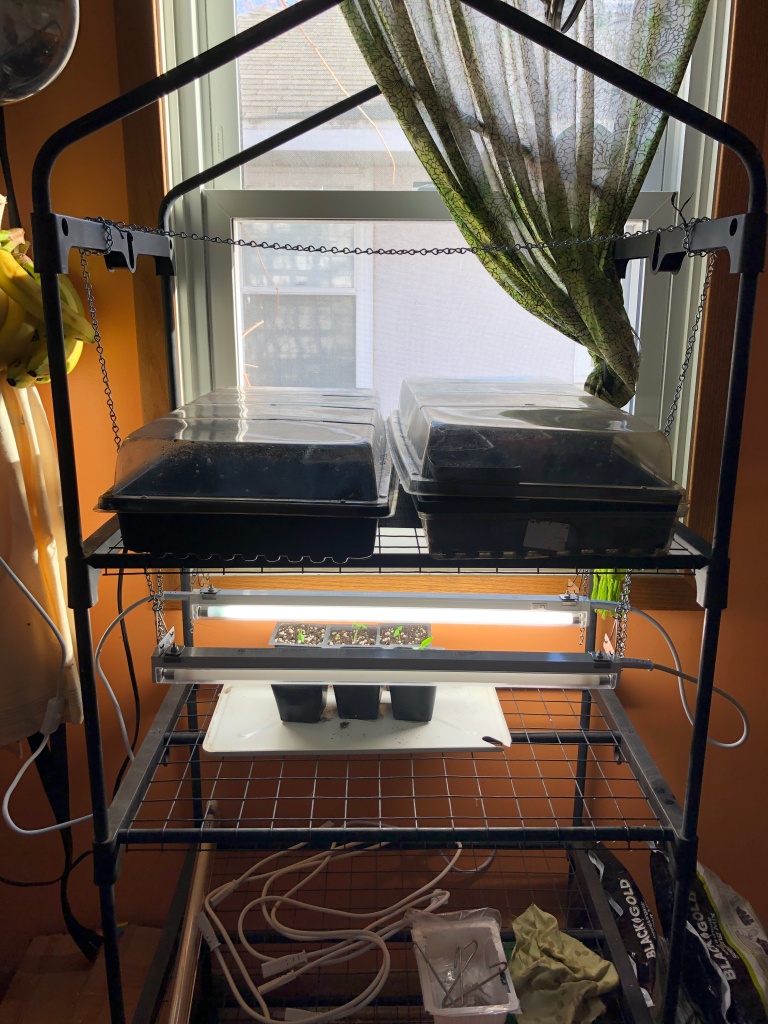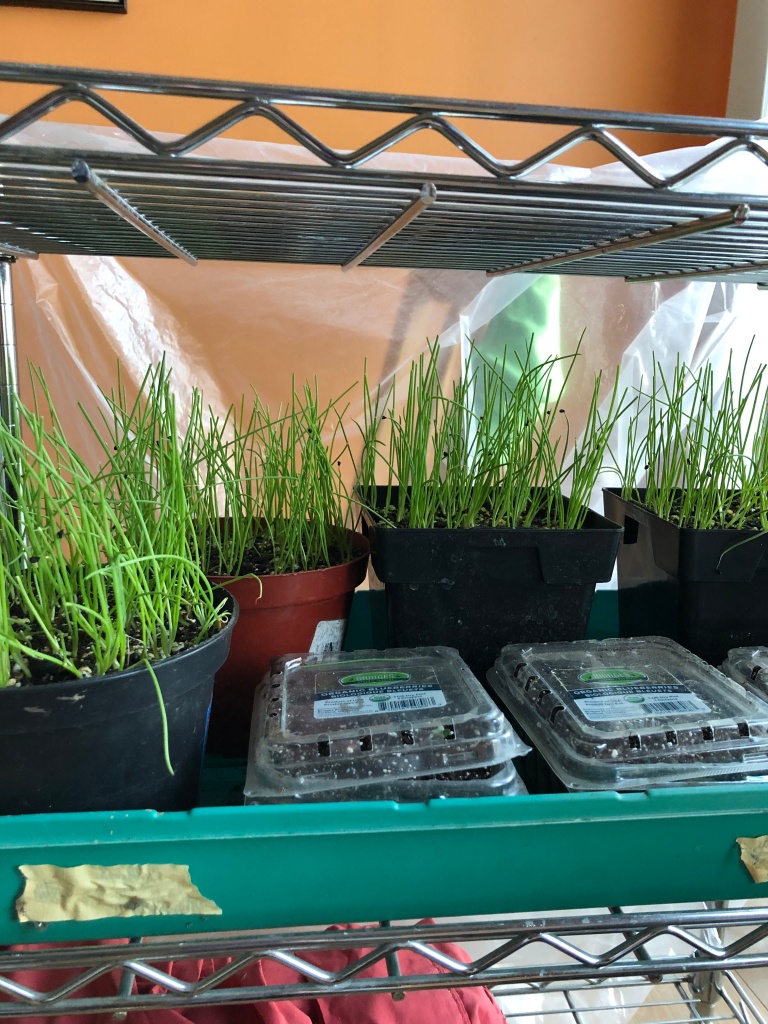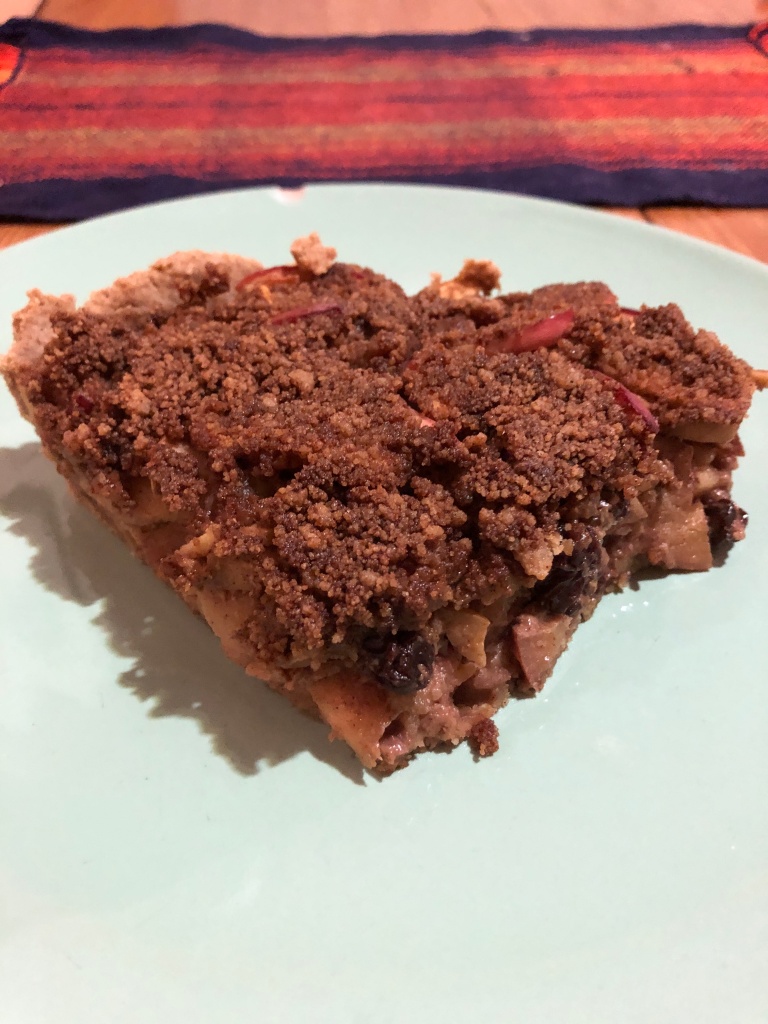Hello friends! Took last weekend off from writing because I didn’t have anything much to say. I still don’t, but here I am anyway. So this could be short and sweet or long and rambling about everything and nothing in particular.

The indoor seed starting is going pretty well. I made the mistake of looking up how to save jalapeño pepper seeds, long after the fact of saving them, to discover that one should only save seed from red jalapeños because they are red when they are fully ripe. Well Eduardo’s jalapeños were green. So then I had a couple days of worrying that they were not going to sprout and I was going to need to buy plants come summer. But lo and behold! Sunday evening when I lifted the little greenhouse dome over the pots, there were tiny sprouts in three of the six pots! Because I am paranoid about seeds not sprouting, I generally plant two seeds to each pot, and by Monday evening there were two sprouts in five pots and one sprout in the sixth pot. I’ve been cheering them on all week and they are doing great.
I’m glad I didn’t know about saving from red peppers when I saved the seeds, because if I had, I probably would not have saved any, figuring it was pointless, and thus wouldn’t have all the little jalapeño sprouts growing in my kitchen. To that end, the lovely lisiinmayenne at This Simple Life blog, posted this week about Bending the Rules If you don’t garden but would like to, or if you’re new to gardening and feel overwhelmed by all the information, the alleged rules on how you should and shouldn’t go about things in the garden—well, check out Lisi’s post. And also, believe me when I say, there are no rules in gardening.
Sure, there are a kind of “best practices,” way to go about gardening in which you may get better results, but seriously, feel free to ignore it all if you want to. The thing all the gardening books and articles don’t tell you is that their “rules” only really work for the person who is writing about their garden. Gardening is an always ongoing experiment to discover what works for you in your garden conditions. This includes the variety of plants and seeds you grow. Just because that particular carrot or tomato doesn’t thrive in your garden doesn’t mean you can’t grow carrots or tomatoes. It could just be the variety. I thought for years I couldn’t grow carrots until I grew one called oxheart, a short, stumpy variety. Turns out I can grow short carrots just fine, but the big long ones, not so much. Why? I have no idea and it doesn’t really matter.
The point is, if a garden “expert” tells you carrots are the easiest thing to grow and you fail at it, even as you make sure the carrots are weeded and watered and have the nutrients and sunlight they need, and you then decide, I’m a horrible gardener I can’t even grow carrots, and this leads you to giving up gardening altogether, I’m here to say, the carrots not thriving are not your fault. For whatever reason, the garden of the “expert” who says carrots are the easiest thing to grow, well for their garden that might be the case, and it has little to do with the gardener.
I guess what I am trying to say, as spring arrives and gardening season beckons, and the seeds and plants at the local nursery ask you to take them home, and you think it would be wonderful to have fresh, vine ripened cherry tomatoes in your summer salad but the plant you bought last year died before it even blossomed, and you have decided you have a black thumb, so why bother even trying again—stop! Do not be deterred from trying again.
Sure, good gardening takes skill and knowledge, just like knitting or woodworking or any other activity. But good gardening also asks that we are always learning. Try and fail, then try again and fail better.

Last year I tried growing onion from seeds for the first time ever. I thought it was all going just fine. But when it came time to plant the sprouts outdoors, they were tiny, stunted spindly things that refused to grow and died quickly in the summer heat. This year, I’m trying again and the sprouts are bigger and stronger than what I had planted out in the garden last year. I have already trimmed them twice, to keep the stalks small and get the plants to concentrate on their roots and sturdiness.
What’s different from last year to this one? First, I saw what the onion starts at the plant sale I go to every year looked like. That in itself was a revelation. Then I learned I needed to start the seeds much, much earlier. I also haven’t used a heating mat on them. Onions prefer cooler temperatures, and they have sprouted just fine in my cool house. And when the weather has been over 40F/4.5C, I’ve had them on a cart outdoors with a “greenhouse” covering over them to warm them up in the sun and create a bit of humidity. Last week I started the Dottenfelder cabbages, also a cool weather plant, without heat and they sprouted in a few days. They are still tiny, but looking strong.
If you are looking for rules and a guaranteed result, then gardening is not for you. But then with climate change, food scarcity might turn up in your area. Going to the grocery store and choosing from an abundance of food from all over the world—strawberries and tomatoes in winter, apples and oranges in summer—will eventually not be possible. And even fruit in season might become a challenge.
If you have access to The Atlantic Magazine, they recently published an article, Fruit Chaos is Coming, about how a warming climate is affecting farmers’ ability to grow fruit not only because of erratic weather, but because quite a bit of fruit requires a certain number of cold days, and in some places those days are getting to be so few that the peaches, plums, apples, grapes, and so on, are no longer viable crops. NPR has a brief article about last year’s poor apple season in the U.S. Northeast that also gives you an idea about the future.
All that to say, if you are new to gardening, you are new in an extra challenging time; one that even “experts” are finding difficult. Any rules that might exist, and even a good many of the best practices, no longer apply. So be wild, jump in, give it a try, but if you fail, unless it is obviously something you did like went on vacation for two weeks and had no one look in to water your tomatoes and basil, be kind to yourself. Keep trying, keep learning. Take good notes—something I am historically bad at but in the past three years have been making a pretty good effort to do—and try again. Talk to your neighbors about what works for them, but don’t be surprised or disappointed if it doesn’t work for you.
You may find that your garden refuses to grow beets but your nextdoor neighbor’s garden grows them magnificently. But maybe your garden grows the best cucumbers and your neighbor with the beets can’t grow a decent cucumber not matter what they do. Plant extra cucumbers and trade them for your neighbor’s beets. Or trade apples from your tree for cherries from your neighbor. You get the idea.
Take a leap into the unknown. Seeds know what to do, we only need to provide the conditions for them to flourish. You don’t need to be an expert or follow the rules. Some of the best non-vegetable gardens I’ve seen on Monty Don’s Gardener’s World are the ones that break all the rules, that are a reflection of the individual gardener and not created by a famous landscape designer. Gardening is a learn-as-you-go undertaking, be fearless! Have fun!
And look what happens when I begin to write and don’t know what I’m going to say!
Last weekend, in addition to the cabbage seeds, I planted (indoors) Banana pepper, Paprika Feher Ozon, and Long Red Narrow Cayenne. This weekend I seeded pots of Catarina pepper, Black Prince tomato, Hungarian Heart tomato, and A Grappoli D’Inverno tomato.
We had a string of 60F/16C days last week and today we aren’t even going to warm up to freezing. The week ahead looks as though the night will be below freezing but the days at or several degrees above. But nothing close to 60F/16C. That will, I hope, cause everything that decided to come up outdoors last week to wait for a bit. The tulips and scilla, the prairie grasses, and the rhubarb have all decided it’s time to grow a month earlier than when I usually see them. I’d push them all back down into the ground if I could, but since I can’t I’m just whispering to them to slow down and not be in such a hurry.
These early spring plants are all pretty cold hardy, but if we get a spring blizzard, which is not uncommon even if it is becoming less and less common, I’m not certain they’d be able to come through it unscathed. I’m an anxious weather watcher these days. If it looks like we are going to get snow or a truly cold snap, I will be out in the garden burying all the new growth in straw to try and protect it.
I suppose telling you how anxious I am about the garden at the moment doesn’t give y’all much encouragement to grow your own, especially since there are so many things to be anxious about these days. But in spite of my current anxiety, there is nothing more truly grounding, relaxing, and centering than growing a garden. Not to mention delicious! If you give it go for yourself and you are feeling overwhelmed or anxious, I am here for you! Really! Feel free to reach out at astoneintheriver dot net at gmail dot com.
Reading
- Book: Terry Pratchett: A Life in Footnotes by Rob Wilkins. Rob Wilkins was Pratchett’s personal assistant for a good part of Pratchett’s writing career. Wilkins was a Discworld fan even before he started working for Pratchett. The biography is entertaining, but is not a critical biography, more of a personal remembrance than anything. There are plenty of fun stories and, as Pratchett began declining from dementia, plenty of sad lettings go. Worth the read if you are a fan, just don’t expect any critical evaluation or deep dives into anything.
- Book: Prophet Song by Paul Lynch. Holy cow, this was an intense and harrowing book! A “what if” imagining of a democratic country, Ireland, turning into an authoritarian one with secret police, people being disappeared, and a civil war. Eilish, the main character, is infuriating because she refuses to see what is happening, and when she does, refuses to believe it won’t somehow right itself and everything will be ok. This keeps her from doing what needs to be done until far too late. It ends without any sort of resolution, but I was left thinking about all those refugees making dangerous and desperate attempts to cross borders and find a better life.
- Article: Bookish Death Cleaning: On What We Keep and What It Means by Molly Templeton. What do you want to happen to your books after you die? Do you get rid of most of them before you die, or do you leave it to those who get to clean up after you?
- Newsletter: Sharon Blackie, Enchantment is Resistance. How living different day by day with imagination, enchantment, and stories can be, and is, a form of resistance.
Listening
- Podcast: Planet Critical: Rewilding the Earth to Rewild Ourselves—Laura Martin. A great conversation about why the 30×30 Plan is a bad idea and why we should be working on restoration not conservation. In a nutshell, the 30×30 Plan and conservation cordons off “nature” as something separate from humans. But humans are part of nature and to make that separation creates sacrifice zones that allows for the continuation of extraction and destruction. They also talk about how carbon offsets are a capitalist scam, as if forcing people off their land in Uganda in order to plant trees to offset the damage done at a coal burning power plant in Pennsylvania is somehow equivalent–it isn’t.
- Podcast: This Machine Kills: The Problem with America’s Ban on TikTok. This podcast was recorded a couple days before the U.S. Congress passed the TikTok ban, but they talk about the real root of the ban and the hypocrisy of it, and how making it a national security China problem, avoids naming and dealing with the real issues, namely capitalism and data privacy.
Watching
- Series: Monty Don’s Spanish Gardens. This is a three-show series. We’ve watched the first two so far.
Quote
We know how it goes. You start out just borrowing a few books from the library, or your grandmother, and thinking you’ve got it under control and that you can handle it–they’re loans, after all, so what’s the fuss about? And next thing you know, you’re moving on to the harder stuff–second-hand books from second-hand bookshops, and actually paying for them with your own money and taking them home with you to own, putting them on a shelf in your bedroom, even. And at that point, most likely, it’s all over and you’ll be on to brand new books before you realize it, and almost certainly an addict for the rest of your life.
Rob Wilkins, Terry Pratchett: A Life With Footnotes, page 59
James’s Kitchen Wizardry
Week before last James tried out popping lentils. We put them on top of mashed potatoes and he made a sauce/gravy to go with. He used black lentils and they made a pleasant crunch. There were leftover lentils that got added to different meals through the week. They didn’t add to the flavor, but they did add to the texture. I suspect we will pop lentils again come summer because they will make a great crunchy addition to salads.

March 14th was Pi Day. James had a cold all week so the Shepherd’s Pie I had hinted at didn’t happen. But home sick from work Wednesday, he had enough energy to make a breakfast apple pie he presented at the table Thursday morning. What is the difference between apple pie for dessert and apple pie for breakfast? Pretty much nothing, except this weekend we at the rest of it for dessert with ice cream. But hey, apples, raisins, walnuts, and an oatmeal crumble for the top of the pie, that’s like breakfast oatmeal except in a pie crust and is a pie crust really all that different from toast?


Hahaha We eat pie for breakfast too. I mean, the ingredients all check out for breakfast, eh? Was your ice-cream, when it was dessert pie, bananas? Or do you have another way of making ice-cream? I hope you have many gardening successes ahead this year. And I love that Pratchett quote. I also love whatever Molly Templeton writes. And this is the second rec for the Paul Lynch novel I’ve heard in short order (after a lull in all the initial excitement surrounding it).
LikeLiked by 1 person
Exactly right regarding the pie ingredients Marcie! 🙂 We usually make our own ice cream using either sweet potatoes, bananas, tofu, or coconut cream (or a combination of these) but this time we splurged and bought a pint of salted caramel. Thank you, garden hopes run high this time of year before reality sets in. Ha! The Paul Lynch book is good, made even more intense because it feels rather close to home this presidential election year.
LikeLike
No surprise that I loved your post, Stefanie! It’s very encouraging, inspiring and written from the heart. Thank you so much for the mention, it makes me very sad that folks are put off the idea of gardening because of ‘expert’ advice; you’re so right in saying the only thing to do is get stuck in and don’t worry. There will always be something that doesn’t do very well in any season but nature has a wonderful way of addressing the balance and giving in abundance in other harvests. I think garden makeover programmes and social media have a lot to answer for, everything having to look so perfect but life ~ and certainly gardening ~ isn’t like that. We have slugs and we have sunflowers, that’s how it goes. I never worry about how ‘wonky’ my crops look, either, because nothing can touch them for flavour and nutrition. Your onions look fabulous . . . happy gardening! 😊
LikeLiked by 1 person
Thank you! I’m so happy to mention you and so glad a friend of mine told me about your blog 🙂 I love watching garden makeover programs knowing full well how unrealistic they are. Even the established gardens Monty Don visits that look so amazing, I always remind myself they have a team of full-time gardeners taking care of it. I used to feel guilty about my garden going “feral” in the heat of August, but then I noticed all the bees and other life happening because of it and now I find it simply glorious in its unruliness 🙂
LikeLiked by 1 person
Such a wonderful post about your gardening experiences and I can so relate. We have opted for container gardening and have had decent success before the hit summer heat hits. My problem is dealing with bugs but that is minor I suppose. Someday I hope to live in an area where I can really garden again. Pie for breakfast is always good and yours sounds heavenly.
LikeLiked by 1 person
Thanks Tina! I had some years of container gardening and summer heat always made it tough because the containers dry out so fast! I hope you live somewhere with more garden options someday. 🙂
LikeLiked by 1 person
You’re welcome Stefanie and me to ☺️
LikeLiked by 1 person
Thank you for a great post! Gardening is always an experiment (at my house, anyway). I get a little worked up about too much grass and weeds in my beds, but ultimately I can’t seem to keep up with it and things “go” or they don’t… and I try not to worry about it. This year I am trying to keep it simple and grow only the things that I really like… but of course I got inspired by a squash trellis idea and now I’m planning and scheming… and I have to move the tomato bed because my fig tree got so big that it started shading the tomatoes (mmm figs….) and it’s time to think about putting in cauliflower… and you know how it goes. We are having a brief gorgeous spring weather window and I am digging and weeding and mowing and enjoying all the daffodils that sprang open. In another day or two, we’ll be back to our regular programming of gray and rainy… but a few days of sun has been amazing.
LikeLiked by 1 person
Thanks Daphne! My garden goes feral every year in August–the time it gets too hot to be outside all day keeping the weeds in check 😀 Ha! I got a huge wooden ladder from my Buy Nothing group last year and put it in the garden for a trellis. The pole beans didn’t much appreciate it so this season I am going to attempt to make squash climb up it. I hope you squash trellis plan is a success! Also, I envy your figs. We’re expecting snow Thursday night and a huge 2-3 days storm of rain and snow starting Sunday. Did you solve your chicken bullying problem?
LikeLike
Well, I did… but I had to separate the flock and get a new small coop. Oh well, it’ll come in handy for periodic chicken-jail or new chicks or whatever. Everyone is much happier (except the bad girls who got separated, but they’re still very near the rest of the flock so I’m hopeful that someday I can re-integrate them) Chickens are so mean! I just fertilized my raspberries, been trying to get them re-established for the last two years. My dad gave me a bunch of raspberry starts from his recent thinning, so I’m hopeful. I need to schedule putting up my trellis or it probably won’t happen, but it would be fun! Putting it on the calendar…
LikeLiked by 1 person
Well darn, too bad you had to get a separate coop for the mean girls. But at least the main flock is happier and they can all still see each other. Maybe all they need is a bit of a “time out” 🙂 Good luck with the raspberries! Mine are looking pretty sad from 3 years of drought. Good luck with the trellis!
LikeLike
This was a very welcome and encouraging post. Thank you! I heartily believe that garden is all about experimentation and playfulness – why not try something and see what happens? That’s my motto – when it comes to gardening, that is. I need to broaden that to the REST of my life, ha ha! That is very distressing to hear about fruit – fruit is my FAVORITE thing and I clearly need to try and get a fruit bush or fruit tree of some kind. I’ve been intimidated before now, but look how perfect your post is to discourage intimidation!
LikeLiked by 1 person
Yay! Thank you too! I love your gardening motto 🙂 Do let me know if you plant something fruity in your garden! I hope you do 🙂
LikeLiked by 1 person
Poor James! I know I’m just now seeing this post, so I hope he recuperated swiftly. Thanks for being so encouraging in this post. My first summer in our house I tried to grow zucchini, which you and I talked about, and I just couldn’t make it grow–a plant that is notoriously dumped off at friends’ and neighbors’ houses because people are just trying to get rid of it!
I know you said you’re gardening and meditating. I recently got a book called Growing Joy by Maria Failla. It combines both plant care and medication. I’m truly enjoying how calming it is. You don’t read it all at once; it’s almost more like tidbits plus journal activities/moments to focus.
LikeLiked by 1 person
James recovered just fine, though his cough lingered quite a long time along with lots of whining :p
Be comforted and encouraged to try different varieties of zucchini in different areas of your garden. It might be your plants just didn’t like where you put them for some reason. I’ve been having trouble with zucchini these last few years because of drought and heat. Don’t get discouraged! Alternately, you can let it be known to zucchini growing friends that you are happy to take their excess if you don’t want to keep trying to grow your own 🙂
Thanks for the book recommendation! It sounds great and I’ve added it to my TBR.
LikeLike